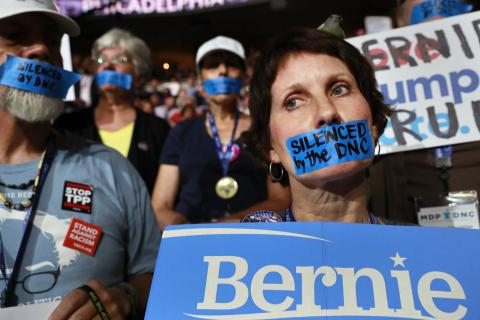https://www.youtube.com/watch?v=daA8hptxSoI
Source: TYT Politics
News broke over the weekend that the DNC Unity Reform Commission (URC) -- a way for the Democratic Party to essentially police itself -- announced a number of non-binding resolutions to show how the party should change its presidential nomination process.
Among other things, the URC proposed significant cuts to superdelegates, passing a resolution that calls for the elimination of about 400 superdelegates. Further, many of the remaining superdelegates would be tied to the voting results of their state.
Remember, former DNC Chair Debbie Wasserman Schultz admitted in an interview on CNN that superdelegates existed to protect party-anointed candidates from grassroots challengers.
https://www.facebook.com/IVN/videos/10152886347702465/
US Sen. Bernie Sanders would win some states and still come out with less delegates because the superdelegates in the state already committed their vote to Hillary Clinton -- superdelegates like former DNC Chair Howard Dean.
https://twitter.com/GovHowardDean/status/706219827535462401?ref_src=twsrc%5Etfw&ref_url=https%3A%2F%2Fivn.us%2F2016%2F03%2F08%2Fformer-dnc-chair-superdelegates-dont-represent-the-people-theyll-do-what-they-want%2F
On the surface, the URC's resolutions sound like a big win for Sanders supporters and the progressive wing of the Democratic Party. They didn't get everything they wanted, but calling on superdelegates to be cut that significantly is better than nothing.
But some progressive groups caution their supporters not to buy into the news just yet.
"The Democratic Party told us everything that we needed to know when it reminded us that as a private corporation, it can pick its candidates in 'cigar filled back rooms.' In other words, the primaries are a charade, designed to create the illusion of choice," states the Movement for a People's Party.
The Movement for a People's Party, formerly Draft Bernie for a People's Party, is a group of progressive independents and former Bernie Sander supporters who believe that a progressive revolution will not happen within the Democratic Party.
Instead, they believe progressives should unite and form a new party, not to compete with the Democratic Party, but to replace it entirely.
The group released a press release over the weekend, pointing out that all levels of the DNC -- the executive board, the bylaws committee, and even the URC -- are comprised of the very people who rigged the primary process in 2016, and could easily do it again.
The group states:
"The corporate lobbyists, Clinton loyalists, and beltway consultants control the Democratic Party’s rules, and progressives are completely at their mercy. They can change them, then change them back. They can make them worse. They can ignore them. They can outright ban Bernie from running at any minute by requiring presidential candidates to have been a registered Democrat for four years prior. What kind of revolution puts itself completely at the mercy of the establishment that it seeks to overthrow?"
“There's nothing complicated about restoring democracy to your primary. If the Democratic Party was whatsoever concerned with the legitimacy of its elections, it could have approved changes at its Philadelphia convention (in July 2016) or at any subsequent meeting of the DNC," notes Nick Brana, founder and director of Movement for a People’s Party.
He adds, “The party has opted to endlessly delay and mislead people who are clamoring for real change.”
The DNC did indeed argue successfully in federal court that as a private organization, they can set whatever nomination rules they want, change them on the fly, and even ignore them if they want. The court ruled that voters cannot turn to the courts to rectify any perceived injustice or violation of their rights in the nomination process.
The political parties pull out all the stops to maintain firm control of their nomination processes and do what they can to prevent popular grassroots challenges from emerging and challenging what the party leadership wants.
Just ask Ron Paul how he was treated by the RNC. Rules were changed at the convention itself to prevent Paul's growing popularity from upsetting Mitt Romney's ascension to the GOP nomination in 2012.
The headlines on the URC's proposals are certainly optimistic:
Source: Huffington Post Source: PoliticoBut remember, the resolutions proposed by the URC are non-binding. They have to be adopted by the DNC rules committee, by the DNC membership, and some of the resolutions would require state parties to get behind them and changes to state law -- like the implementation of automatic voter registration.
The URC is an easy way for the DNC to say, "Look, we are doing something," but considering that the party continues to argue for its right to hand-pick its presidential nominee if it wants, it appears to be an effort just to quiet those calling on the party to change.


